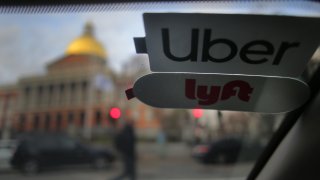
Massachusetts will become the second state ever to pursue legal action against ride-hailing giants Uber and Lyft over their classification of workers, Attorney General Maura Healey announced Tuesday.
Healey filed a lawsuit against the two companies alleging that, by categorizing their nearly 200,000 Massachusetts drivers as independent contractors rather than employees, Uber and Lyft are violating the state's wage and labor laws.
With that misclassification, Healey alleged, the popular app-based services are denying drivers who routinely work full-time hours or more access to unemployment insurance, overtime, workers' compensation, sick time and anti-retaliation protections.
That denial allows the companies to pocket "hundreds of millions" of dollars every year that they should be paying in benefits and to the state, Healey said.
"The bottom line is that Uber and Lyft have gotten a free ride for far too long," she said during a Tuesday virtual press conference. "For years, these companies have systematically denied their drivers basic workplace protections and benefits and profited greatly from it."
Local
In-depth news coverage of the Greater Boston Area.
In May, California also sued Uber and Lyft on similar grounds. Massachusetts is only the second state to seek such action.
Healey will seek a declaratory judgment effectively ordering Uber and Lyft to comply with wage and labor laws covering independent contractors that have existed in their current form since 2004.
Her lawsuit does not immediately seek any payments or relief from the companies, but she said that step could follow if the judgment is awarded.



